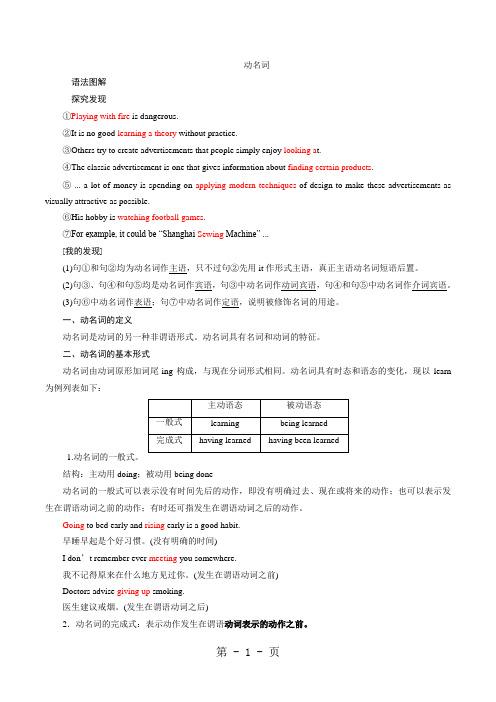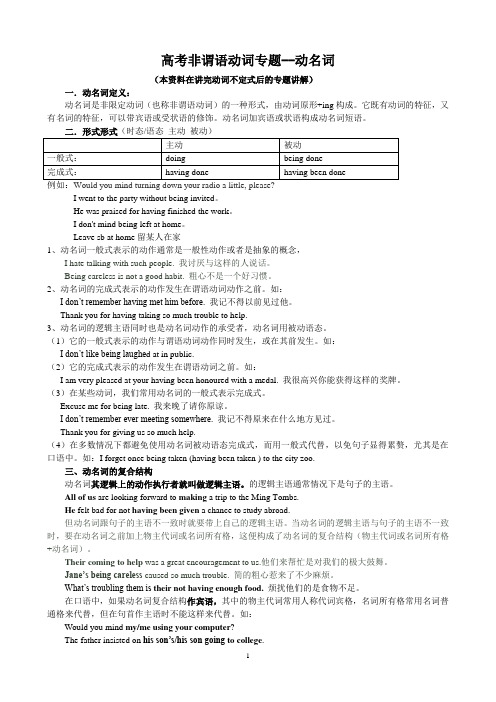高考英语专题之动名词
- 格式:docx
- 大小:30.74 KB
- 文档页数:10

英语总结:高考复习之动名词用法小结动名词可以跟动词一样,拥有自己的宾语或者状语,也可以像名词那样,在句子中作主语、宾语等成分。
动名词的构成方式:v.+ -ing。
一、动名词的句法功能动名词在句子中可以作主语、宾语、表语、定语和同位语。
1.作主语用来表示一般性或经常性的意义,有时可与不定式互换。
如:Swimming with dolphins is one of the world s most profitable tourist activities.注意:单个的动名词或动名词短语作主语时,谓语动词用单数。
例1 (2011年高考新课标卷)Planning so far ahead no sense-so many things will have changed by next year.A. madeB. is makingC. makesD. has made解析:答案为C。
动名词(planning so far ahead)在句中作主语。
句意为:计划这么超前没有意义,到明年好多情况会发生变化的。
破折号前说的是现在的客观情况,应该用一般现在时,因此正确答案为C。
动名词短语作主语时,为了避免句子头重脚轻,保持句子平衡,习惯将动名词短语放在句尾,而用it作形式主语。
这样,句子结构一目了然,便于读者理解。
如:It s no good spending too much time chatting or playing online games.用于这种形式的表语常是一些特定的形容词或名词,如useful,good,nice,no use,no good,fun等。
2.作宾语动名词既可作动词的宾语,也可作介词的宾语。
如:He loved experimenting and his aim was to become a scientist like his father.The manager said he was looking forward to seeing all the newly-made plans carried out in time.注意:句中若出现宾语补足语时,常用it作形式宾语,而把真正的宾语后置。

动名词语法图解探究发现①Playing with fire is dangerous.②It is no good learning a theory without practice.③Others try to create advertisements that people simply enjoy looking a t.④The classic advertisement is one that gives information about finding certain products.⑤ ... a lot of money is spending on applying modern techniques of design to make these advertisements as visually attractive as possible.⑥His hobby is watching football games.⑦For example, it could be “Shanghai Sewing Machine” ...[我的发现](1)句①和句②均为动名词作主语,只不过句②先用it作形式主语,真正主语动名词短语后置。
(2)句③、句④和句⑤均是动名词作宾语,句③中动名词作动词宾语,句④和句⑤中动名词作介词宾语。
(3)句⑥中动名词作表语;句⑦中动名词作定语,说明被修饰名词的用途。
一、动名词的定义动名词是动词的另一种非谓语形式。
动名词具有名词和动词的特征。
二、动名词的基本形式动名词由动词原形加词尾-ing构成,与现在分词形式相同。
动名词具有时态和语态的变化,现以learn 为例列表如下:主动语态被动语态一般式learning being learned完成式having learned having been learned1.动名词的一般式。
结构:主动用doing;被动用being done动名词的一般式可以表示没有时间先后的动作,即没有明确过去、现在或将来的动作;也可以表示发生在谓语动词之前的动作;有时还可指发生在谓语动词之后的动作。

专题02 动名词九大考点归纳(讲案)-2025年高考英语一轮复习知识清单(全国通用)【上好课】2025年高考一轮复习知识清单专题02 动名词九大考点归纳(讲案)原卷版(快问快答+思维导图+精讲精练+分类通关+原创语填)目录一、动名词用法快问快答P2二、动名词用法思维导图P2三、动名词用法知识清单P3 知识清单一:动名词的复杂形式P3 知识清单二:部分动名词主动形式表示被动意义用法P3 知识清单三:只接doing作宾语的动词归纳P4 知识清单四:接to do/doing作宾语意义不同的动词P4 知识清单五:常考含介词to的动词短语P5 知识清单六:常考省略介词类动词短语P5 知识清单七、动名词作主语典型用法P6 知识清单八:动名词复合结构典型用法P6 知识清单九:动名词作表语和定语典型用法P7 四、动名词用法分类通关P7 分类通关(一)单句填空(高考真题)P7 分类通关(二)单句填空(模拟试题)P8 分类通关(三)动名词助力应用文写作升格P8 分类通关(四)动名词助力读后续写升格P9 分类通关(五)语法填空(外刊原创)P9 2024感动中国人物--燃烧自我照亮他人的特教老师刘玲琍P9一、动名词用法快问快答Q1:什么叫动名词?A1:顾名思义,动名词就是一个动词-ing形式兼有动词和名词一些特征。
Q2:动名词(短语)能充当什么成分?A2:动名词(短语)在句中作主语、宾语、表语、定语。
Q3:学习动名词难点在哪里?A3:一是需要区分不定式和动名词作宾语的区别,二是掌握动名词形式的复杂变化。
Q4:阅读过程中遇到动名词(短语)怎么办?A4:利用括号法把整个动名词(短语)括起来视为一个整体来理解。
Q5:学好动名词(短语)有什么意义?A5:一能化繁为简迅速提高文章阅读能力,二能在书面表达巧妙运用动名词(短语)提升句子表达效果。
Q6:如何才能学好动名词(短语)?A6:一是努力掌握动名词(短语)基本知识框架,二是加强训练和背诵,积少成多,见多识广。

高考非谓语动词专题--动名词(本资料在讲完动词不定式后的专题讲解)一.动名词定义:动名词是非限定动词(也称非谓语动词)的一种形式,由动词原形+ing构成。
它既有动词的特征,又有名词的特征,可以带宾语或受状语的修饰。
动名词加宾语或状语构成动名词短语。
I went to the party without being invited。
He was praised for having finished the work。
I don't mind being left at home。
Leave sb at home留某人在家1、动名词一般式表示的动作通常是一般性动作或者是抽象的概念,I hate talking with such people. 我讨厌与这样的人说话。
Being careless is not a good habit. 粗心不是一个好习惯。
2、动名词的完成式表示的动作发生在谓语动词动作之前。
如:I don’t remember having met him before. 我记不得以前见过他。
Thank you for having taking so much trouble to help.3、动名词的逻辑主语同时也是动名词动作的承受者,动名词用被动语态。
(1)它的一般式表示的动作与谓语动词动作同时发生,或在其前发生。
如:I don’t like being laughe d at in public.(2)它的完成式表示的动作发生在谓语动词之前。
如:I am very pleased at your having been honoured with a medal. 我很高兴你能获得这样的奖牌。
(3)在某些动词,我们常用动名词的一般式表示完成式。
Excuse me for being late. 我来晚了请你原谅。
I don’t remember ever meeting somewhere. 我记不得原来在什么地方见过。

高考英語動名詞2022高考英语语法:动名词的用法一、与谓语动作同时发生He kept smiling.他不停地笑。
Everyone is practising speaking English.大家都在练习说英语。
We had a good time in dancing with them.我们同他们跳舞玩得很快乐。
二、发生在谓语动作之后He advised leaving early.他建议早点离开。
Would you mind opening the window?可否劳驾把窗户翻开?She is considering changing her job.她在考虑换个工作。
【注】动名词所表示的动作发生在谓语动作之后,通常与相关动词或介词等的含义有关。
如表示“建议”的动词advise,suggest,表示“推迟”的动词delay,put off,表示“考虑”的动词consider,等等,由于动词本身词义的缘由,它们后面用作宾语的动名词所表示的动作通常都发生在谓语动作之后。
三、发生在谓语动作之前Suddenly every body stopped talking.突然大家都停顿谈话了。
I remember mailing the letter.我记得寄了那封信。
After reading your letter I knew what had happened.看了你的信后我就知道出什么事了。
【注】动名词所表示的动作发生在谓语动作之前,通常也与相关动词或介词等的含义有关。
如动词forget(遗忘),regret(懊悔),remember(记住),stop(停顿),finish(完成),admit(成认)等,它们后接动名词作宾语时,动名词所表示的动作通常都发生在谓动作之前。
四、没有明确的先后关系Teaching is learning.教学相长。
The film is worth seeing a second time.这部电影值得再看一次。

高考英语专项之动名词语法图解探究发觉①Playing with fire is dangerous.②It is no good learning a theory without practice.③Others try to create advertisements that people simply enjoy looking at.④The classic advertisement is one that gives information about finding certain products.⑤... a lot of money is spending on applying modern techniques of design to make these advertisements as visually attractive as possible.⑥His hobby is watching football games.⑦For example, it could be “Shanghai Sewing Machine”...[我的发觉](1)句①和句②均为动名词作主语,只只是句②先用it作形式主语,真正主语动名词短语后置。
(2)句③、句④和句⑤均是动名词作宾语,句③中动名词作动词宾语,句④和句⑤中动名词作介词宾语。
(3)句⑥中动名词作表语;句⑦中动名词作定语,说明被修饰名词的用途。
一、动名词的定义动名词是动词的另一种非谓语形式。
动名词具有名词和动词的特点。
二、动名词的差不多形式动名词由动词原形加词尾ing构成,与现在分词形式相同。
动名词具有时态和语态的变化,现以learn为例列表如下:主动语态被动语态一样式learning being learned完成式having learned having been learned1.动名词的一样式。
结构:主动用doing;被动用being done动名词的一样式能够表示没有时刻先后的动作,即没有明确过去、现在或今后的动作;也能够表示发生在谓语动词之前的动作;有时还可指发生在谓语动词之后的动作。
高考英语复习之动名词考点真题解析1.worth +动名词= worthy of being done 做某事是值得的.Is this film worth seeing again?这部电影值得再看一次吗?Whatever is worth doing at all is worth doing well. 凡是值的做的,就值得好好去做.注意: 这个句型中的动名词总是用主动形式表示被动意义. 类似的句型还有:worth while +动名词(也可用动词不定式)=worth the time spent in doing itIt isn’t worth while doing (or: to do )that .做那件事不合算2.cannot help +动名词=be unable to refrain from doing ---不禁;忍不住;不得不He couldn’t help laughing when he heard the funny story.他听到这个滑稽故事时,忍不住大笑起来.注意: 类似的惯用句型还有: cannot stand /bear +动名词I can’t stand waiting any longer.再等下去我可受不了I won’t bear your talking to me like that.我不能忍受你跟我那样谈话.3.feel like+动名词=be inclined to do ----想要Do you feel like taking a walk with me?跟我一起去散步怎么样?He doesn’t take care of his eats what he feels like eating.他不注意健康;想要吃什么就吃什么。
注意:该句型多用于疑问句或否定句。
Like 在这时是介词,而不是动词。
4.How /what about +动名词=How do you like ---? 或What do you think of ---?怎么样?常用来征求别人的意见。
Verb-ing 可表示动名词,也可表示现在分词,区别如下动名词具有名词的性质,同时又保留了动词的功能(可接宾语或状语),可以做主语、宾语、表语、定语现在分词表示正在发生的动作,可以做定语、表语、状语、宾语补足语动名词的基本形式及功能一、动名词做主语(表抽象的总的概念)e.g. Reading the novels by Lu Xun also opens the doors to finding new ways of thinking of the world.e.g. Being absorbed in the research work, as we all know, is what he is interested in.比较:Walking is good for health, and he usually walks every day. But today, he wouldn’t like to walk.注:to do不定式表某一次具体的动作。
注意:it 做形式主语的句型:It is no use doing sthIt is no good doing sthIt’s worthwhile doing / to do sthIt’s a waste of time doing / to do sth注意:动名词的复合结构作主语(用所有格的形式one’s doing)e.g. Jason’s / His being addicted to drugs made his parents rather worried.注意:此句可转成it做形式主语It made his parents rather worried that he was addicted to drugs.高考题点击:1. Fishing is his favorite hobby, and _____.he’d like to collect coins as wellhe feels like collecting coins, tooC. to collect coins is also his hobbyD. collecting coins also gives him great pleasure注意:在and连接的并列句中,两个主语要保持一致的形式。
高考英语动名词的考点分析动名词的考点:一、动名词作主语___is a good form of exercise for both young and old (NMET1992)A. the walkB. walkingC. to walkD. walk (B)动名词作主语表示习惯性,泛指经常性、不具体的动作。
而不定式做主语则表示一次性、特指、未来具体的动作。
由句意可知主语表示泛指的、经常性的动作。
二、动名词作宾语1.the officer narrowly escaped ____in the hot battle (MET80)A. have killedB. to killC. to be killD. being killed (D)分析:此题考查的是只能用动名词做宾语的动词。
Advise, allow, appreciate,avoid,consider,delay,enjoy,escape,excuse,finish,keep,imagine,mind,mis s,permit,practise,risk,suggest等动词及feel like, insist on, be fond of, what (how )about等固定词组要用动名词做宾语。
本题动名词的逻辑主语是动名词动作的承受者,故用了被动语态。
2. She looks forward every spring to ____the flower-lined garden (shanghai 95)A. visitB. paying a visitC. walk inD. walking in (D)分析:此题考查含有介词to的短语动词的用法。
Look forward to ,be (get)used to (习惯于),pay attention to, prefer ---to 等短语中的to 为介词,后跟名词和动名词作宾语。
动名词语法图解探究发现①Playing with fire is dangerous.②It is no good learning a theory without practice.③Others try to create advertisements that people simply enjoy looking a t.④The classic advertisement is one that gives information about finding certain products.⑤ ... a lot of money is spending on applying modern techniques of design to make these advertisements as visually attractive as possible.⑥His hobby is watching football games.⑦For example, it could be “Shanghai Sewing Machine” ...[我的发现](1)句①和句②均为动名词作主语,只不过句②先用it作形式主语,真正主语动名词短语后置。
(2)句③、句④和句⑤均是动名词作宾语,句③中动名词作动词宾语,句④和句⑤中动名词作介词宾语。
(3)句⑥中动名词作表语;句⑦中动名词作定语,说明被修饰名词的用途。
一、动名词的定义动名词是动词的另一种非谓语形式。
动名词具有名词和动词的特征。
二、动名词的基本形式动名词由动词原形加词尾-ing构成,与现在分词形式相同。
动名词具有时态和语态的变化,现以learn 为例列表如下:主动语态被动语态一般式learning being learned完成式having learned having been learned1.动名词的一般式。
结构:主动用doing;被动用being done动名词的一般式可以表示没有时间先后的动作,即没有明确过去、现在或将来的动作;也可以表示发生在谓语动词之前的动作;有时还可指发生在谓语动词之后的动作。
Going to bed early and rising early is a good habit.早睡早起是个好习惯。
(没有明确的时间)I don’t remember ever meeting you somewhere.我不记得原来在什么地方见过你。
(发生在谓语动词之前)Doctors advise giving up smoking.医生建议戒烟。
(发生在谓语动词之后)2.动名词的完成式:表示动作发生在谓语动词表示的动作之前。
结构:主动用having done;被动用having been doneThe old man thanked me for having helped him find his relative’s house.那位老人感谢我帮他找到亲戚的家。
I don’t remember having ever been given a chance to do it.我不记得曾被给予做这件事的机会。
3.动名词的否定式:由“not+动名词”构成。
She regretted not listening to you, which caused this mistake.她后悔没有听你的话,导致了这一错误。
His not having done his homework made his teacher very angry.他没有完成作业使老师很生气。
[即时演练1]完成句子①____________________________________ can help you improve your learning effectively.养成良好的学习习惯能帮助你有效地改进你的学习。
②____________________________________ when they heard the funny story.听到这个滑稽的故事,孩子们忍不住笑了。
③Thank you for ______________________________________.谢谢你给了我这么多的帮助。
④She regretted ____________________________________.她后悔没看那个电影。
⑤No one ________________________________ in public.没有人喜欢当众被嘲笑。
三、动名词的句法功能动名词具有名词的性质,因此在句中可以作主语、表语、宾语、定语等。
1.作主语Reading aloud is a good way in learning a language.大声朗读是学习语言的一个好办法。
Working in these conditions is not a pleasure but a suffer.在这种条件下工作不是愉快而是痛苦。
[课堂点津](1)在It is no use/no good/useless/worthwhile/a waste of time/fun doing sth.句型中,用it作形式主语,后面的动名词作真正的主语。
It’s no use complaining without taking any action.不采取行动而只是抱怨是没有用的。
It is a waste of time talking about such useless things.谈论这些没用的事情是在浪费时间。
(2)动名词作主语泛指经常性的动作,而不定式多表示特指的、一次性的、具体的动作。
Being invited to the palace ball made her excited. 被邀请参加宫廷舞会使得她非常兴奋。
To be invited to the palace ball would be exciting. 受邀参加这次宫廷舞会将是令人兴奋的事。
(3)单个动名词作主语,谓语动词一般用单数形式。
Planting many trees is very good for our environment. 植树对我们的环境非常有好处。
[即时演练2] 单句语法填空①(安徽高考改编)________________ (Ignore) the difference between the two research findings will be one of the worst mistakes you make.②(湖南高考改编)_________________ (understand) your own needs and styles of communication is as important as learning to convey your affection and emotions.③(福建高考改编)_____________ (know) basic first-aid techniques will help you respond quickly to emergencies.④As far as I ’m concerned, it ’s no good ______________ (argue) with him. ⑤Making friends ___________ (play) an important part in our life. 2.作宾语 (1)作动词宾语They advise solving the problem in this way. 他们建议用这种方法解决这个问题。
Would you mind opening the window? 打开窗子你介意吗?(2)有些动词或词组后跟动名词或不定式都可以,但意思不同。
常见的有:mean ⎩⎪⎨⎪⎧to do sth.打算做某事doing sth.意味着做某事forget ⎩⎪⎨⎪⎧to do sth.忘记去做某事(未做)doing sth.忘记做过某事(已做)regret ⎩⎪⎨⎪⎧to do sth.对即将做的事表示遗憾(未做)doing sth.对做过的事表示后悔(已做)try ⎩⎪⎨⎪⎧to do sth.尽力去做某事doing sth.试着做某事 go on ⎩⎪⎨⎪⎧to do sth.继续做另一件事doing sth.继续做原来做的事remember ⎩⎪⎨⎪⎧to do sth.记着去做某事(未做)doing sth.记得做了某事(已做)I remember being taken to the Summer Palace today. 今天我还记得被带去颐和园的情景。
(已去过)Please remember to come and play with me again someday. 请记住以后有时间再来玩。
(还没来) How I regret not accepting his suggestions. 我多么后悔没有接受他的建议呀。
I regret to tell you that you failed. 很遗憾告诉你,你失败了。
(3)下列动词可接动名词的主动形式表示被动意义,相当于不定式的被动形式。
need /want/require /deserve doing =need/want /require/deserve to be done The bike needs repairing . =The bike needs to be repaired . 这辆自行车需要修一下。
[即时演练3] 单句语法填空①(江西高考改编)When it comes to ___________(speak) in public, no one can match him. ②(陕西高考改编)It ’s quite hot today. Do you feel like ___________ (go) for a swim?③(浙江高考改编)______________ (hear) how others react to the book you have just read creates an added pleasure.④—That would mean _____________ (waste) a lot of labour. —Really? I don ’t mean _____________ (waste) any labour.⑤The young trees we planted last week require ____________ (look) after with great care. ⑥I don ’t mind ___________ (travel) by bus, but I hate ___________ (stand) in queues.⑦We can ’t imagine her ____________ (succeed) in the entrance examination, for she has never been to school.⑧He is looking forward to ___________ (spend) his holiday in Britain. 3.作表语动名词作表语通常是对主语进行说明、解释。